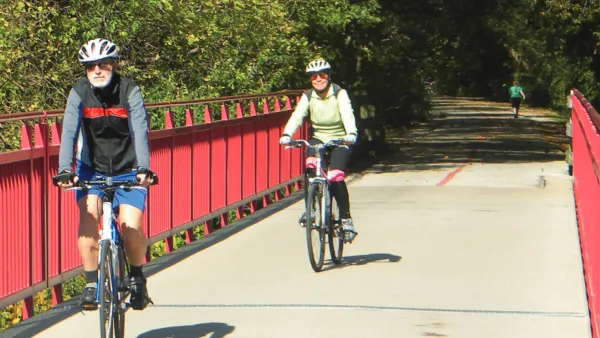A $63 million investment to build the Cultural Trail in Indianapolis has returned $1 billion in increased property value and other economic benefits since 2008.
John Tuohy reports: "Property values have increased by $1 billion, businesses report more customers and higher sales, and residents feel safer Downtown since construction of the 8-mile Cultural Trail, according to a survey conducted by Indiana University Public Policy Institute."
"The assessment measured the economic impact of the trail from 2008 to 2014 and examined 1,747 parcels within 500 feet of the trail. The institute also sent questionnaires to 66 businesses and 558 trail users." The findings are contained in a report titled, "Assessment of the Impact of the Indianapolis Cultural Trail: A Legacy of Gene and Marilyn Glick" [pdf].
The article includes more details about the findings of the report, including one caveat about the recession's impact on the property values along the trail.
Hat tip to Brent Toderian for sharing the article.
FULL STORY: Study: Property values along Cultural Trail up $1B

Maui's Vacation Rental Debate Turns Ugly
Verbal attacks, misinformation campaigns and fistfights plague a high-stakes debate to convert thousands of vacation rentals into long-term housing.

Planetizen Federal Action Tracker
A weekly monitor of how Trump’s orders and actions are impacting planners and planning in America.

In Urban Planning, AI Prompting Could be the New Design Thinking
Creativity has long been key to great urban design. What if we see AI as our new creative partner?

King County Supportive Housing Program Offers Hope for Unhoused Residents
The county is taking a ‘Housing First’ approach that prioritizes getting people into housing, then offering wraparound supportive services.

Researchers Use AI to Get Clearer Picture of US Housing
Analysts are using artificial intelligence to supercharge their research by allowing them to comb through data faster. Though these AI tools can be error prone, they save time and housing researchers are optimistic about the future.

Making Shared Micromobility More Inclusive
Cities and shared mobility system operators can do more to include people with disabilities in planning and operations, per a new report.
Urban Design for Planners 1: Software Tools
This six-course series explores essential urban design concepts using open source software and equips planners with the tools they need to participate fully in the urban design process.
Planning for Universal Design
Learn the tools for implementing Universal Design in planning regulations.
planning NEXT
Appalachian Highlands Housing Partners
Mpact (founded as Rail~Volution)
City of Camden Redevelopment Agency
City of Astoria
City of Portland
City of Laramie




























